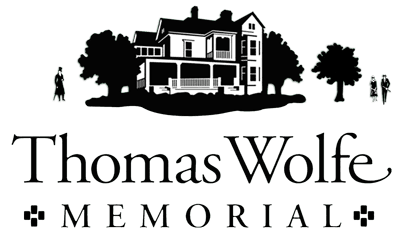Younghill Kang and Thomas Wolfe
An April 2020 issue of The New York Review of Books recently reminded us of the friendship between Korean born Younghill Kang and Asheville’s native son Thomas Wolfe. The article by Ed Parks, written after the republication of Kang’s second novel East Goes West (1937) by Penguin Classics in May 2019, recounts the fascinating life and career of Kang. https://www.nybooks.com/articles/2020/04/23/younghill-kang-east-goes-west/
Another reminder is in the collection at the Thomas Wolfe Memorial State Historic Site. Kang gifted Julia Wolfe an inscribed copy of his first novel The Grass Roof (1931) for her 80th birthday in 1940. The inscription reads “A Happy Birthday to the dear mother of Thomas Wolfe-whose enormous vitality, joy of life, magnificent poems and sincere friendship helped me so much. Very sincerely yours Younghill Kang 16 February 1940.”
Thomas Wolfe did not consider himself a literary critic and was very sensitive to all criticism of his own work. He only wrote one book review in his lifetime. Thomas Wolfe’s review of Kang’s first novel, The Grass Roof was titled “A Poetic Odyssey of the Korea That Was Crushed.” It appeared in the New York Evening Post April 4, 1931. Like Wolfe’s own work Kang’s novel exhibits a poetic writing style and is largely autobiographical. Kang’s work was based on his early experiences and subsequent efforts to escape them in distant lands. Wolfe described his friend’s work in glowing terms. Wolfe wrote “Kang is a born writer, everywhere he is free and vigorous; he has an original and poetic mind, and he loves life; again and again in his book a person, a scene, and an action are described in a few words of rich and vivid brevity.”
For those who do not know Kang’s story, Younghill Kang was born about 1903 in the Hamkyong province of northern Korea. Between 1910 and 1945 The Korean Peninsula was occupied by Japan. As a boy Kang spent several years living in Japan before returning to Korea in 1919 only to be arrested for participating in protests calling for Korean independence. Two years later he escaped Korea arriving in San Francisco with four dollars in his pocket. Through years of hard-work he pursued an education and in 1927 received a master’s degree in English at Harvard University. In 1929 he began teaching at New York University where he first met Thomas Wolfe.
Wolfe was on the verge of publishing his book Look Homeward, Angel. The two connected as aspiring writers and prolific readers and regularly had dinner together. Kang recalled spending many hours of conversation in Thomas Wolfe’s apartment. Over dinner one evening Kang showed Wolfe the beginning chapters of his novel in progress and agreed to loan Wolfe the chapters to review. Wolfe shared the manuscript with his editor Maxwell Perkins, who gave Kang a $500 advance to finish it. The Grass Roof received international acclaim. It was eventually translated into ten languages and is still considered a pioneering work in Asian American literature. Kang’s second novel in 1937 was the sequel titled East Goes West. He received an honorary doctorate from Korea University in 1970. He continued teaching, writing, translating other works, and even farming until the end of his life in 1972. Today he is considered by many to be the father of Korean American literature.
Strange, David. “Thomas Wolfe’s Korean Connection.” The Thomas Wolfe Review (Spring1994) 36-41.
